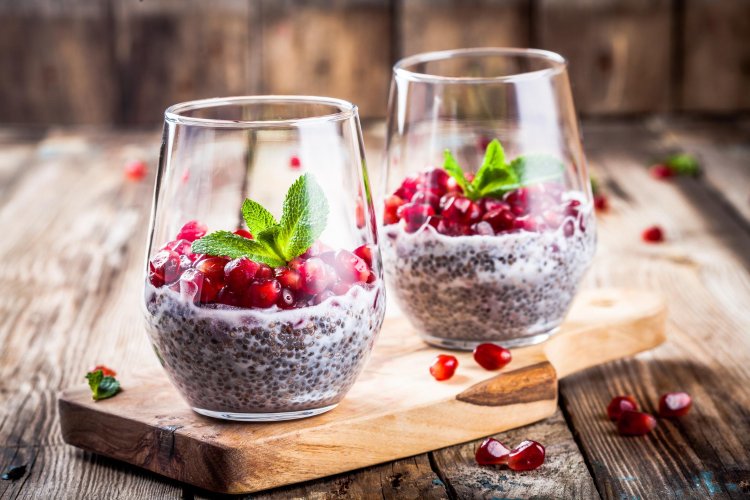The Nutritional Powerhouse: Uncovering the Health Benefits and Versatile Uses of Chia Seeds
Chia seeds, derived from the Salvia hispanica plant native to Central and South America, have garnered significant attention in recent years for their exceptional nutritional value and health benefits. Used by ancient civilizations like the Aztecs and Mayans for their sustainable energy and medicinal properties, chia seeds have emerged as a modern-day superfood cherished for their versatility and nutrient density.

Nutritional Profile
Chia seeds are a powerhouse of essential nutrients:
Omega-3 Fatty Acids
Chia seeds are one of the richest plant sources of alpha-linolenic acid (ALA), a type of omega-3 fatty acid crucial for cardiovascular health. Omega-3s are known for their anti-inflammatory properties and potential benefits in reducing the risk of heart disease.
Fiber
A single ounce (about 28 grams) of chia seeds provides a substantial amount of dietary fiber, which is essential for digestive health, managing cholesterol levels, and promoting feelings of fullness.
Protein
Despite their small size, chia seeds are relatively high in protein, containing all nine essential amino acids. This makes them an excellent protein source, particularly beneficial for vegetarians and vegans.
Antioxidants
Chia seeds boast an impressive array of antioxidants, including quercetin, caffeic acid, and chlorogenic acid. These compounds help neutralize free radicals in the body, protecting cells from oxidative stress and inflammation.
Vitamins and Minerals
Chia seeds are particularly rich in calcium, phosphorus, magnesium, and manganese. These minerals play crucial roles in bone health, energy metabolism, and overall cellular function.
Health Benefits
Incorporating chia seeds into your diet can yield numerous health advantages:
Heart Health
The omega-3 fatty acids in chia seeds contribute to lowering triglycerides, reducing inflammation, and improving cholesterol levels, all of which support cardiovascular health.
Weight Management
Due to their high fiber and protein content, chia seeds can help promote satiety and reduce appetite, potentially aiding in weight loss and weight management efforts.
Digestive Health
The soluble fiber in chia seeds forms a gel-like substance when mixed with liquids, which supports healthy digestion by regulating bowel movements and promoting the growth of beneficial gut bacteria.
Blood Sugar Control
Research suggests that chia seeds may help stabilize blood sugar levels, potentially benefiting individuals with type 2 diabetes by improving insulin sensitivity and reducing spikes in blood glucose after meals.
Bone Strength
With their significant calcium, phosphorus, and magnesium content, chia seeds support bone health and may help prevent osteoporosis and maintain dental health.
Culinary Applications
Chia seeds are incredibly versatile and can be incorporated into various dishes and beverages:
Chia Pudding
Mix chia seeds with milk (dairy or plant-based) and a sweetener of choice, then refrigerate overnight for a delicious and nutritious pudding.
Smoothies
Add a tablespoon or two of chia seeds to your favorite smoothie recipes for added texture, fiber, and protein.
Baking
Use chia seeds as an egg substitute by combining them with water to create a gel-like consistency, ideal for vegan baking recipes.
Salads and Yogurt
Sprinkle chia seeds over salads, yogurt, or oatmeal to enhance nutritional value and provide a crunchy texture.
Breads and Cereals
Incorporate chia seeds into bread doughs, muffins, pancakes, or sprinkle them over cereals and granolas to boost fiber and protein content.
Practical Tips
Hydration
Since chia seeds absorb water and expand, it's essential to consume them with adequate fluids to prevent dehydration or discomfort.
Storage
Store chia seeds in a cool, dry place in an airtight container to maintain freshness and prevent spoilage.
Quantity
While chia seeds are nutrient-dense, moderation is key due to their calorie content. A serving size of about 1-2 tablespoons per day is generally recommended.
In conclusion, chia seeds are not merely a nutritional trend but a valuable addition to a balanced diet, offering a wide range of health benefits backed by scientific research. Whether you're looking to enhance cardiovascular health, manage weight, improve digestion, stabilize blood sugar levels, or boost overall nutrient intake, chia seeds provide a convenient and versatile solution. By incorporating them into your daily meals and snacks, you can harness their nutritional power and enjoy their deliciously nutty flavor while supporting your well-being.
Disclaimer
The information provided in this article is for educational purposes only and should not be considered medical advice. If you have any health concerns or are experiencing symptoms, it is important to consult with a healthcare professional, such as a doctor or clinic, for proper diagnosis and treatment. Always seek the advice of your doctor or other qualified health provider with any questions you may have regarding a medical condition. Do not disregard professional medical advice or delay in seeking it because of something you have read in this article.
Hashtags
#ChiaSeeds #Nutrition #HealthBenefits #HeartHealth #WeightManagement #DigestiveHealth #BloodSugarControl #BoneStrength #HealthyEating #Superfood #PlantBased #VeganProtein #Antioxidants #DietaryFiber #Omega3
What's Your Reaction?





















